#7500
Explore tagged Tumblr posts
Text
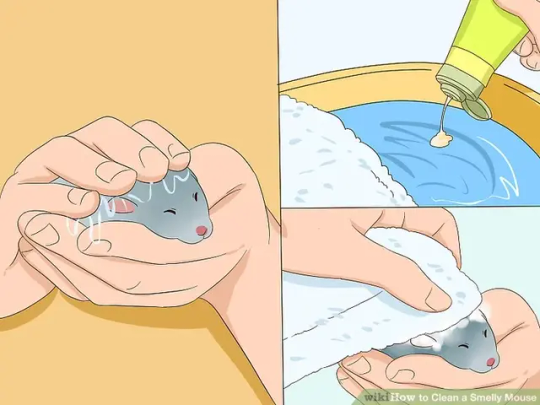
mousewashing or something idk I don't play horror games
11K notes
·
View notes
Text
Place your estimates in the tags
#7500#faberry#brittana#faberritana#lol#clexa#hollstein#supercorp#preath#avatrice#f/f#f/f fanfic#f/f wishlist#femslash#femslash fanfic#femslash fic#femslash wishlist#the femslash wishlist
120 notes
·
View notes
Text
7500 (2019)

7500 is a small but effective little thriller. Go in it with the right expectations and it’ll win you over, even if it never becomes more than a “one-and-done” kind of movie. If you like Joseph Gordon-Levitt, he's in every scene, which might be enough to recommend the picture on its own.
On a flight from Berlin to Paris, Captain Michael Lutzmann (Carlo Kitzlinger) and First Officer Tobias Ellis (Joseph Gordon-Levitt) hear some commotion behind them. Suddenly, a terrorist bursts into the cockpit, incapacitates Captain Lutzmann and injures Tobias before getting subdued. The other terrorists take the passengers hostage, leaving Tobias with few options.
The film is almost entirely set in the plane's cockpit. Before settling into the main location, we get some shots that build up the tension as the camera follows several men in the airport. This isn’t “Airforce One”; don’t expect Tobias to become John McClane. 7500 (which is the Emergency Transponder Code for “unlawful interference”) is about a man trapped in a difficult position. We all know what will happen if Tobias opens the door and lets the terrorists inside the cockpit. Once upon a time, we might’ve thought “if we do what they want, they’ll ask for money or some kind of political prisoner be released.” In 2019? We know at best, they’ll crash it in the water somewhere, killing everyone aboard. At worst, thousands could die as the A319 smashes into a populated skyscraper. Tobias can’t let them in. He has to ignore their threats but that’s easier said than done when they can communicate with him. “Open the door or we kill a hostage”. We quickly glance at the camera outside the door and see that they have a blade at someone's throat. The hostage is crying and begging for their life. Could you do nothing in that position? It gets even worse; one of the flight attendants is Tobias' girlfriend, Gökce (Aylin Tezel). How long before they figure this out, or just randomly pick her as the next person to threaten?
The situation changes frequently, which prevents you from getting tired of seeing Joseph Gordon-Levitt’s face. Like his character, you’re always trying to figure out the right thing to say, if the video footage of the terrorists will give him any clues on how to proceed, or if some opportunity will present itself. Can you turn a passenger plane upside down without crashing it? Maybe he can get one of the terrorists to sympathize with him. One of them (played by Omid Memar) seems less enthusiastic about this operation than the rest. Or maybe, the terrorist who managed to get inside the cockpit, the one that’s tied up is the key. Watch out. He could easily be the biggest threat to everyone’s safety.
In terms of criticisms, I’d say that 7500 does what you expect it to with the ingredients it’s got, and nothing more. There aren’t really any big surprises in this movie. That’s fine but it prevents it from becoming a great film. 7500 is 92 minutes of increasing tension with solid performances from its cast, which is more than enough for me to recommend it. (May 2, 2021)

#7500#movies#films#movie reviews#film reviews#Patrick Vollrath#Senad Halilbasic#Joseph Gordon-Leveitt#Omid Memar#Aylin Tezel#Carlo Kitzlinger#Murathan Muslu#Paul Wollin#2019 movies#2019 films
3 notes
·
View notes
Text
Flight 7500: a unknown force that kills

Takashi Shimizu's Flight 7500 (also known as 7500) is a supernatural horror film that was released in 2014. The movie revolves around a group of passengers aboard Vista Pacific Airlines Flight 7500, which departs from Los Angeles and is bound for Tokyo. As the flight progresses, the passengers encounter a series of eerie and supernatural events that escalate into a terrifying ordeal.
Plot Overview
The film begins with the passengers settling in for their overnight journey across the Pacific Ocean. However, turbulence soon strikes, and when it subsides, a passenger mysteriously dies. This event triggers a series of supernatural occurrences, leading to chaos and fear among the remaining passengers. The confined space of the airplane heightens the tension, as the characters grapple with the unknown force that seems to be targeting them.
Cast and Characters
Flight 7500 features a notable cast, including:
Ryan Kwanten as Brad Martin
Amy Smart as Pia Martin
Leslie Bibb as Laura Baxter
Jamie Chung as Suzy Lee
Jerry Ferrara as Rick Lewis
Scout Taylor-Compton as Jacinta Bloch
Christian Serratos as Raquel Mendoza
These characters include vacationing couples, a thief, and a businessman with a mysterious box, all of whom must confront the supernatural threat together.
Production and Release
Directed by Takashi Shimizu, known for his work on The Grudge, the film was written by Craig Rosenberg. It was produced by Taka Ichise and Roy Lee, who have both been involved in various successful horror projects. Flight 7500 had a troubled release history, initially scheduled for 2012 but ultimately premiering in international markets in 2014 before its U.S. release on April 12, 2016.
Reception
The film has garnered mixed reviews, with some praising its unique premise of a haunted airplane, while others criticized its execution and originality. Despite its challenges, Flight 7500 adds to the small genre of horror films set in the confined space of an aircraft, exploring themes of isolation and fear in a high-stakes environment.
Flight 7500 stands out for its setting and the inherent tension of a supernatural thriller aboard a plane, making it a noteworthy entry in the horror genre.
1 note
·
View note
Text
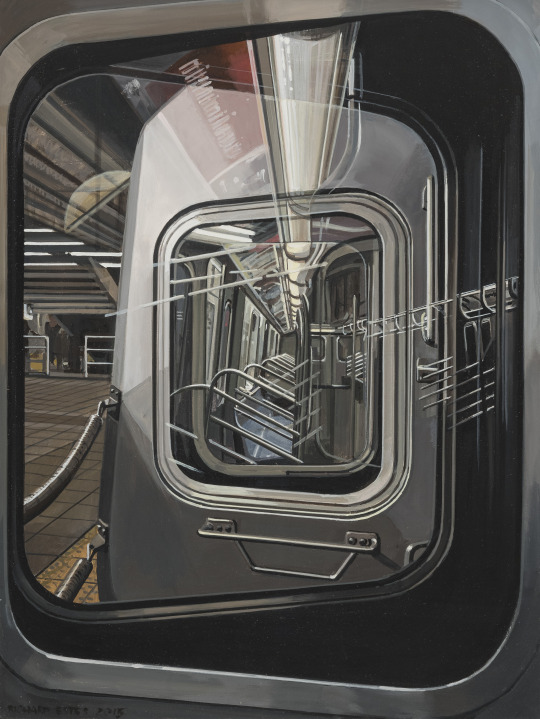
The L Train at 14th Street, Richard Estes, 2015
Oil on board 16 x 12 in. (40.64 x 30.48 cm)
#art#painting#richard estes#contemporary art#photorealism#realism#21st century art#21st century#2010s#oil#american#new york#new york city#subway#100 notes#250 notes#500 notes#750 notes#1000 notes#2500 notes#5000 notes#7500 notes
10K notes
·
View notes
Text
Try the Raspberry Watermelon Tyson 2.0 Round 2 7500 Puff Vape

If you’re on the hunt for a refreshing and long-lasting vape experience, the Raspberry Watermelon Tyson 2.0 Round 2 7500 Puff Disposable is here to deliver. With its enticing flavor combination and impressive puff count, this disposable vape is a must-try for both beginners and seasoned vapers.
A Flavorful Fusion: Raspberry and Watermelon
The Tyson 2.0 Round 2 features a delicious blend of raspberry and watermelon, two flavors that perfectly complement each other. The sweet and slightly tart raspberry pairs beautifully with the juicy, refreshing taste of watermelon, creating a harmonious vaping experience that’s both satisfying and invigorating. Each puff bursts with flavor, making this vape a delightful treat for your taste buds.
Why Choose Tyson 2.0 Round 2?
7500 Puffs of Pleasure: One of the standout features of the Tyson 2.0 Round 2 is its impressive 7500 puff count. This means you can enjoy prolonged vaping sessions without annoying about walking out of juice. It’s perfect for those who want a reliable, long-lasting vape.
Convenience at Its Best: As a disposable vape, the Tyson 2.0 Round 2 is incredibly easy to use. There’s no need to refill or recharge – simply open the package, start vaping, and dispose of it when you’re done. It’s an ideal option for on-the-go vaping or for those who prefer a hassle-free experience.
Premium Quality: Tyson 2.0 is known for its commitment to quality, and the Round 2 disposable is no exception. Made with high-quality ingredients and advanced technology, this vape ensures a smooth, consistent, and enjoyable experience from the first puff to the last.
Stylish and Compact Design: The sleek and compact design of the Tyson 2.0 Round 2 makes it easy to carry in your pocket or bag. Its stylish appearance is a bonus, adding a touch of sophistication to your vaping routine.
The Perfect Vape for Any Occasion
Whether you’re at home, at work, or out with friends, the Raspberry Watermelon Tyson 2.0 Round 2 7500 Puff Disposable is a versatile choice. Its delightful flavor and long-lasting performance make it suitable for any setting. Plus, its convenience means you can enjoy a satisfying vape whenever and wherever you want.
A Great Choice for All Vapers
Whether you’re new to vaping or a seasoned pro, the Tyson 2.0 Round 2 is designed to meet your needs. Beginners will appreciate its ease of use, while experienced vapers will love the robust flavor and high puff count. It’s a versatile and reliable option that caters to a wide range of preferences.
Try It Today!
If you’re ready to elevate your vaping experience, give the Raspberry Watermelon Tyson 2.0 Round 2 7500 Puff Disposable a try. With its enticing flavor, long-lasting performance, and hassle-free design, it’s sure to become your new favorite vape. Don’t miss out on this delicious and convenient vaping option – try it today and discover why so many vapers are raving about the Tyson 2.0 Round 2!
Experience the perfect blend of raspberry and watermelon in every puff. Indulge in the Tyson 2.0 Round 2 7500 Puff Disposable and enjoy a vaping experience like no other.
0 notes
Link
Check out this listing I just added to my Poshmark closet: Breyer Wood Corral Traditional Series Model .
0 notes
Text
thoughts on the Movie - 7500
The suspense of the pilot’s state&what might injure him next was well done. The pain&anguish he needed to face when his partner was taken hostage. The weighing up between the life of one human&the life of the rest on the plane. The protocols to follow. The many split second decisions he must make - to harm (as self defence) or not to harm the other individual. Weighing the pros and cons.
0 notes
Text
ULTIMISSIME OSAPP- Sulle Aggressioni, Maschere Anti-Gas e 7.500 Posti in più per detenuti: le strane priorità di Delmastro e Nordio
Secondo i dati riportati da un sindacato di Polizia Penitenziaria (ma non l’OSAPP) sulla base di quanto appurato dall’Ufficio Ispettivo del Dap (chissà come fanno ad averli???) negli ultimi quattro mesi del 2023, 614 sono state le aggressioni dei detenuti nei confronti degli appartenenti al Corpo di Polizia Penitenziaria, 137 di queste hanno prodotto prognosi di oltre 8 giorni e 44 addirittura…
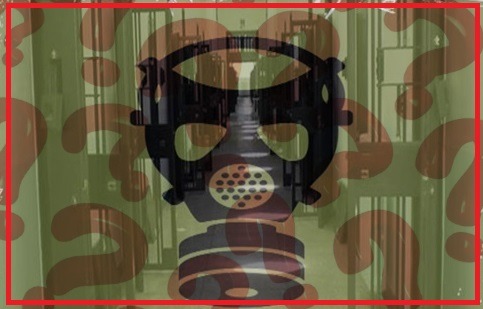
View On WordPress
#.it#7500#agente#agenti#alsippe#anppe#antigas#asppe#autonoma#autonomo#beneduci#cgil#cisl#cnpp#comunicato#comunicato stampa#consippe#CORPO#cosp#dap#delmastro#detenuti#DI#di domenico#donne#generale#in#ispettivo#leo#maschere
0 notes
Text
मुख्यमंत्री कन्या विवाह योजना: मुख्यमंत्री कन्या विवाह योजना ... 7500 कन्याओं के विवाह का लक्ष्य, मिलेंगे 50 हजार रूपए...
रायपुर । छत्तीसगढ़ में गरीब परिवारों की बेटियों की शादी अब पूरे सम्मान के साथ होगी। मुख्यमंत्री भूपेश बघेल की पहल पर मुख्यमंत्री कन्या विवाह योजना की राशि अब बढ़ाकर 50 हजार रुपए कर दी गई है। विवाह के अवसर पर प्रत्येक कन्या को 21 हजार रुपए की राशि बैंक खाते या बैंक ड्रॉफ्ट के रूप में दी जाएगी। इसके अलावा 15 हजार रुपए की राशि के उपहार भी दिए जाएंगे। चालू वित्तीय वर्ष में प्रथम छमाही में तीन हजार…

View On WordPress
#….छत्तीसगढ़#7500#Timeline#एक्सक्लूसिव#कन्या#कन्याओं#का#के#छत्तीसगढ़#न्यूज़#ब्रेकिंग#मिलेंगे#मिलेंगे 50 हजार रूपए...#मुख्यमंत्री#मुख्यमंत्री कन्या विवाह योजना#योजना#योजना तहत देय लाभ#राजनीति#राज्य#रायपुर#रूपए&8230;#लक्ष्य#विवाह#हजार
0 notes
Text
"old man yaoi" and the characters are 28 and 30
#vic talking about stuff#i saw this multiple times this week#all around these ages#100#300#500#1000#1500#2000#3000#5000#7500#10000
10K notes
·
View notes
Text
i was going to make a joke about the ridiculous candy corn ass shape of this roman intaglio seal ring but then i saw the extremely tiny mouse engraved into it and i'm going to throw up from how small it is. if i saw this in person i think i'd cry


#tagamemnon#anyone wanna give me. checks website. 7500 US dollars so i can buy it#queueusque tandem abutere catilina patientia nostra
568 notes
·
View notes
Text
hello 🫡 i am not dead
usually i'd post an art summary around this time but i didn't rly post anything this year oops. i feel kinda sad abt that ngl :')
idk for some reason i just couldn't get into digital art this year! i also don't have a lot of time to draw anymore so it's easier to just doodle in my sketchbook, but not rly anything i'd post 🤔
i wanna get back into digital tho! i'll try my best in the new year :'))) for now i offer you: a lil guy going >:) from my wip folder pls enjoy

#text#doodle#hector#also apparently i hit 7500 followers- but i didn't do anything???#thank you?!#and hny!!!
186 notes
·
View notes
Text
Tech Lives: An Ungodly Long Essay
(AKA: Turns out that my Tech Lives compilation post comment was actually a threat.)
There have been hundreds if not thousands of posts since Plan 99 aired wondering if Tech might have made it after his fall - it's probably been brought up more than any other hanging plot point, even after season 2 scooped up Omega and left us on a massive cliffhanger. Now that season 3 has started, though, Omega and Crosshair are home (for now) but we have received an almost aggressive lack of Tech info. So, I've gathered up some of the stronger Evidence for why Tech might be fashionably late but still on his way back from The Void!
THE LEAD UP
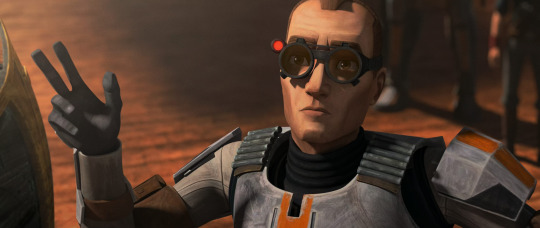
So to start, let's go back to what came before the whole Incident. This will focus mostly on season 2, seeing as that was definitely Tech's season to shine, but with bits about plotlines in season 1. Which brings us to our first bit, that's not really evidence so much as some gentle push-back on a common argument.
Doomed By Character Development?
We've all seen this particular situation before - a character is slated for a tragic death, so just before it happens the writers gives them a little extra relevance to the plot to make sure the audience really feels it when the time comes. The Clone Wars was especially good at this, giving characters like Fives an arc of his own that ended in his tragic death. Season 7 gave us a better look at Jesse, first in the Bad Batch's intro arc and then again through the Siege of Mandalore, all to bring us to the chip activation that led to his ultimate death.
When season 2 started off with one of the two intro episodes spotlighting Tech and our first breather episode of the season also spotlighting him, people started to get worried. So is it fair to say that his spotlight in season 2 was setting him up for a permadeath?
Looking at it, I don't think so, for multiple reasons. For one, Tech didn't just get a spotlight episode, his development dominated a good chunk of the whole damned season, often taking priority over the other characters that wouldn't be dropped into the mists. While giving a little bit of character development to a doomed character can be a good move, giving ALL your development to a doomed character ends up feeling like a good portion of your season was actively pointless.
The Bad Batch is not an open ended show. It seems to have been planned for the three seasons it got, and they would have gone into it knowing they had a set amount of time to work with. Dedicating so much time to developing Tech in preparation for a character death takes away all of their opportunity to develop, well, anything else.
But, along with the amount of time that was dedicated to Tech as a character through season 2, they also didn't develop him in the ways that most often get used for a doomed character. Namely...
That Sure Is A Lot Of Open Plot Lines
And not one of them got tied up. Currently, Tech has two open plot lines to himself, both started in season 2, as well as a key place in the overall show narrative arc. As the overall show narrative arc takes precedence, we'll start with that.
The Bad Batch sets up a few different narrative arcs very early. One is if clones can be more than soldiers - this is the central thing that we see them struggling against from the start, they've been created to be soldiers and don't know much else about how to function in the world. Theoretically this arc can be fulfilled with one or two of them still dying as soldiers, as long as a few of them make it to find a new life for themselves.
The arc that can't be fulfilled without everyone though is the ongoing thread of reuniting the batch. Much of the show is geared towards making the viewer want this specific end result, as soon as they talk about Crosshair, Omega says they'll just have to get him back and complete their family. The end of season 1 teases us with this only to pull it away at the last moment, then season 2 teases us with it again only to yet again pull it away, this time seemingly permanently.
Ending one of your key narrative threads you've been using to draw audiences in only 2/3rds of the way into the show and without ever resolving it... well it would be a choice. If Tech is gone for good then the last time we saw everyone together would be the end of season 1. Rewatches would lack impact because something that was made to seem so vital ended up going nowhere, and the series finale would never quite reach the height that hearing the full batch theme kick in over the team fighting droids together did. It absolutely destroys the central narrative to leave him gone without ever having reunited the family.
And then there's his personal plots.
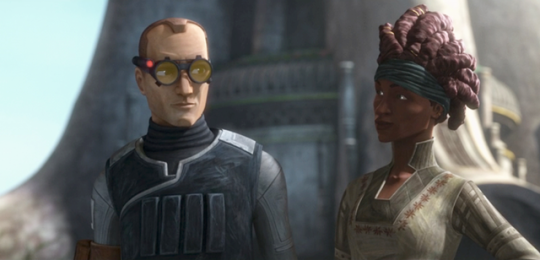
Let's start with the obvious one. Tech got a whole potential love interest this season and they absolutely did not resolve a damn thing about it.
Again, this takes a trope that we all know - the young army man that's going to go home and finally marry his girl, who has his whole life ahead of him, but dies tragically in his final mission - and seemingly intentionally subverts the beats. Because what makes the trope work is that the plot line is resolved as soon as that young man decides how he's going to move forward. He can't die uncertain of if he's going to marry his girl, he has to make a decision, and the longer we spend on the relationship to his girl the stronger the decision has to be to consider the narrative line resolved and free him up for some tragedy.
Tech/Phee is a tentative little 'will they or won't they' romance. They're flirting, they're feeling each other out, they're seeing if they're compatible. To tie up this narrative line we would have to find out if they are or not, get a yes or a no on the question. Will they or won't they? We simply don't know because the writers didn't put a resolution in.
We do get the traditional pre-mission scene with them, which would normally be when we get the first kiss or perhaps the promise of a date, either of which would have had me digging Tech's grave for him to fall into from the second it happened. Or even a 'we can't do this right now, but maybe some day it will be the right time' which would have been a kind of lukewarm resolution but would have at least represented a decision.
Instead we get a scene that almost aggressively refuses to resolve anything. They have an awkward interaction, but not one that says they won't get together, no promises are made for the future, no decision point is reached, and the plot line is still dangling wide open when Tech falls to his supposed death. If we truly leave it off here, well, what was the Tech/Phee subplot for? Why did we spend precious time on it when it could have been spent on something else, if it was meant to make Tech's death hit harder why did it not go further?
A second subplot with Tech is that he certainly made the most progress on seeing options outside of the Empire - it starts early on in Ruins of War when he meets Romar and gets his eyes opened to the idea of cultures that existed unconnected to the war. Serenno existed before the war and before the separatists, and Romar introduces Tech to that idea of an ongoing culture. He gets a taste of racing in front of a cheering crowd, leans further into his teaching of Omega and gets new insights from her regarding their lives as soldiers, his relationship with Phee picks up right when he finds out that she is interested in the preservation of cultures. It's a quiet little subplot, but Tech was seeing the full scope of what the galaxy contained beyond being a soldier in a war.
But, like the Tech/Phee, it never resolves. He never decides to settle down, he never chooses to stop being a soldier or even openly discusses the idea of what life will look like after. Rescuing Crosshair isn't positioned as a final mission that they have to complete in order to give up their lives as soldiers. Without that decision point being reached, the plot stays open, we never find out what he Would Have Done so we don't get a sense of the future that he would lose by dying, which is what the purpose of these types of plots is for a planned permadeath.
The Kaminoans don't create without purpose and writers working on a three season timeline don't typically write without it either. So if we spent the time on Tech/Phee but Tech is dead before it ever went anywhere, if we spent time on Tech's relationship with being something other than a soldier but he never really pursues it, what is the payoff?
Too Much of a Survivor To Die?
There's also the matter of how they chose to build Tech's character this season. Namely they beefed that man's skills up incredibly high making it intensely unbelievable that he's dead without seeing some sort of concrete proof. Things we know about Tech as of the end of season 2 include:
Incredible pain tolerance - Tech fractures his femur in Ruins of War and seems shockingly unbothered by it. The femur is frequently listed as one of the most painful bones to break. This is not a broken toe the man is hobbling around on, he fractured the strongest bone in the body and kept going through the woods. He physically fought and killed a man with that busted femur.
Lightning fast mental processing - this is of course on display nowhere so much as Faster where he's put up against droids and wins by taking calculated risks that no one else is willing to try.
A cool head in stressful circumstances - this one is hilarious because he outright says it, but Tech does demonstrate time and time again that when it comes down to it, he's able to keep calm no matter the circumstances.
Essentially, we spend the entirety of season 2 setting up why Tech is the perfect person to drop out of the sky and have him survive. He has the ability to keep calm and come up with a plan in seconds and he has the grit to keep moving even if he's grievously injured once he hits the ground. When you set a character up like this, you can still kill them, but you have to work harder to do it convincingly. Leaving Tech not at the moment of death but with probably at least a minute to act in and then not showing us the body is the exact opposite.
We have a moment in The Crossing showing us Tech's precise aim, and it comes up again to brutal effect when he shoots out the connection on the rail car. If moments through the season were used to set up that particular instant of the finale, then we can't discount the numerous scenes demonstrating his survival skills as being irrelevant to his chances.
Plus, looking back at Ruins of War - one of the big moments in the episode is towards the end, where Romar tells Tech, "I'm a survivor. Remember?" The camera then lingers on Tech for a long moment. It's not the kind of action that demonstrates his capabilities as above, but it works to associate the words with Tech in the viewers mind. Romar is a survivor, and Tech is a survivor too. And when you intend to kill someone off, it's kind of an odd choice to spend that whole season setting them up as a survivor.
THE FALL
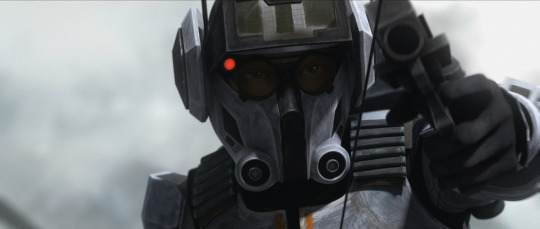
Which brings us to the scene itself. Plan 99, implied to be one of the last ditch plans that they have. It's absolutely a heartbreaking scene, and one that can be tough to analyze when it's so well done, because it's rough to watch repeatedly. But, it's worth doing, because the scene itself is FULL of questions, some structural others more based in the visual presentation.
What is Plan 99?
Well, that's just it, we don't actually know.
We know what it's implied to be, a self sacrifice plan where one of the batch gives their life for the others to get away. But in show it's never actually defined, leaving the full meaning of Plan 99 up to interpretation. It could be as simple as what it's implied to be, but that brings up questions like 'why not provide any lead up or foreshadowing for it?' and 'does killing yourself actually count as a plan?'
Removing the assumptions from it gives us room to speculate. Is the plan actually that they leave him behind, dead or alive? Hunter ordered them to do so without a plan number in season 1, but he is the sergeant, so plan 99 could easily be something that bypasses his authority - if a batcher calls a plan 99, you go and you don't question his decision. It's certainly closer to a plan if there's something they are supposed to be doing from their end rather than just an announcement of intent.
It's not strictly evidence one way or another, but it is something of note when Tech's entire sacrifice is based around a plan that we're not privy to the details of. TBB has hidden its twists in ambiguity before, so it would not be the first time that it let us assume something only to pull the rug out later. But ambiguity is not the only thing that makes this scene stand out in the raising questions department.
Pacing Goes Out The Window
Generally speaking, a self sacrifice is the climax of an episode. Think Kanan, Hardcase, Gregor, Hevy, etc - Even a minor character sacrificing their life tends to make up the most climactic portion of any given episode, let alone one of the characters from the title squad. It gets to be the big central moment, the big rush of music and feeling, the pinnacle of the viewers attention.
Tech's sacrifice is not. It happens around 5 minutes into the episode, is rapidly moved past with barely a moment to think, and then the actual climax is Omega's capture on Ord Mantell. They even repeat the music when Omega is captured, except much stronger this time, making it clear that this is the emotional crux of the episode, this is the scene that is supposed to stick with you.
The opportunity to make it the climax of an episode was certainly there. The storyline could have been adjusted to put Tech's fall at the end of The Summit, allowing more time in Plan 99 for processing his loss and making it feel final. The pacing choice is one that doesn't allow the viewer to process the loss, only giving us maybe a couple minutes of time with actual emotional reactions before we're barreling off to the next plot point. Why was Tech's death de-emphasized within the episode if it is indeed our last moment with this central character?
Tarkin, Eriadu, & Saw Gerrera
A lot goes into the set-up for Plan 99. We have Tarkin's base on Eriadu as the setting they're working within, going up against Tarkin for the first time since early season 1. This is the big leagues, and something that's come up in multiple interviews is that when going into the den of one of the franchise's big bads we have to have consequences, something to demonstrate that Tarkin is not to be trifled with.
Sounds reasonable enough. Except Tarkin doesn't actually do anything in either of these episodes. The thing that actually threw them off was Saw's planning mixing in with their own.
All Tarkin does upon finding out that the batch is stuck on the rail is order an air strike and ignore that this would kill many of his own men. This is certainly evil, but it's standard Imperial evil. Rampart would have given that order. Hemlock would have given that order. The guy in Tipping Point that we know for 5 minutes before he fried himself would have given that order.
So if the point of this finale was to demonstrate Tarkin's power, then bringing Saw in both complicates the plot and devalues what they're claiming they are trying to show. So is the point to get them to Tantiss? No, because they fail in that. They don't plant the tracker, they're no closer to finding Crosshair than they were before.
By all accounts the point of the whole endeavor is in fact just to drop Tech off a sky rail for reasons unknown and injure Omega to force them to go back to Ord Mantell. These two things could have happened anywhere in any way of course, so why choose Eriadu and why choose to complicate the plot by introducing Saw rather than letting Tarkin handle the job?
They're questions we don't have answers to yet, but they're very hard to get answers to if Tech is dead and completely out of the picture. Having a dead body on Eriadu is fairly useless to the plot, having a living Tech on Eriadu though? That has potential to move them huge leaps forward in a very short amount of time once we bring him back in. Especially given his conversation with Saw prior to everything going downhill - Tech was in favor of gathering intel from the facility rather than destroying it.
And what about Saw, anyway? If he was genuinely there to cause problems and fly away, again, that's a plot wrinkle that isn't needed and took time away from everything else. If he's there because they needed someone to pick Tech up though? There's potential there.
Did Tech's Sacrifice Mean Anything?
In universe, Tech's sacrifice means everything, of course. It's a decision made in the moment to risk everything to save his family. It's a noble deed and one he does without hesitation. But pulling away from that narrow scope of an in universe perspective, what did we accomplish narratively with his fall?
Well... not much actually! They got over the bump in the road that they encountered all of five seconds ago and promptly crashed headfirst into another, different bump in the road. Tech's dramatic sacrifice didn't allow them to escape unharmed, it didn't allow them to find Crosshair, it just allowed them to move a few steps forward, after which Omega is almost killed and then captured, which is a fairly weak reason to sacrifice a whole major character.
But not every character death is exclusively about narrative, sometimes it's about the character arc itself. So does this close out anything for Tech's character development? Again, not really. Tech has always been completely loyal to the squad and would have risked anything for his family. He never had a choice not to fall, it was either just him or the whole team, and he is an endlessly logical actor. The action would have played out the same had it happened in the series premier or the season 1 finale, or any other time in the show. If anything it's a backtrack on his character by putting him solidly back into the soldier box that the show is trying to let the clones grow out of.
Maybe it's not about Tech's character though, maybe it's about everyone else's! Does his death change anyone's trajectory? Again... no, not really. We'll get into season 3's lack of mentioning Tech later, but in the immediate aftermath of his fall, no one's course or actions is majorly changed because of his loss. Hunter wants to go back to Pabu where it's safe, the same thing he wanted to do before they ever left for this mission. Omega puts herself in danger to save her brothers, which has been one of her defining traits since season one. Wrecker is following Hunter's lead, same as he always did. (We get very little of what Echo hopes to do, but the opening of season 3 reveals that they went back to work with Rex, exactly like they were doing before.)
So narratively nothing required him to die, the character's arc isn't completed, and the other characters aren't motivated to change. If Tech dies here, it's the picture of a shock value death. It doesn't complete or inform his character, it doesn't need to narratively happen in order to put Omega on the path to being captured, and thematically it exists just to give the viewer an unnecessary gut-punch when just the failure to rescue Crosshair and the loss of Omega would have been enough.
Framing is Everything
In a death scene there's nothing more powerful than our final shot of a character. The very last we'll ever see of them, the image that will linger in our minds when we think of that character from then on. This is especially important in animation where everything has to go through several iterations before deciding on what that final look will be. You want it to be impactful, you want the audience to have one final connection to the character before they're gone for good.
So why does Tech die with his helmet on?
If there's one thing TBB is good at, it's their expression work, and a death scene is a perfect place to show off their full range, which is why most deaths meant to have a heavy impact occur with faces unobscured. Crosshair loses his helmet and takes Mayday's off so we can see both of their faces as Mayday dies, Slip, Cade, even Clone X and Wilco, all die helmetless. Looking into older series you have Kanan dying without his mask, Fives, Hardcase, Waxer all dying helmetless with one last good look at their faces and expressions.
And while Tech's helmet gives us a good look at his eyes, the rest of his face goes unseen, and Wrecker's face as he watches this happen is completely obscured. We're denied a look at a lot of their expressions as the decision is made and Plan 99 is executed, rendering it less personal than it otherwise could have been. Tech could have lost his helmet in the blast that knocked him from the rail, Wrecker could have had his helmet knocked off at some point to give us a good look at his expression. TBB isn't known for pulling its punches, so why leave our final look at Tech's face back in The Summit and not here?
Then there's the framing choices. We get some absolutely amazing shots of Tech during the fall, from taking the shot to falling backwards towards the cloudy cover - but here's where some interesting choices are made. Rather than letting our last shot of him be a face up shot that keeps eye contact with the camera as he falls, they make the choice to have him flip over, and we hold the shot as the rail car goes down after him, partially obscuring him.
Which means instead of our last glimpse of Tech being something like this.

We end up with something closer to this.
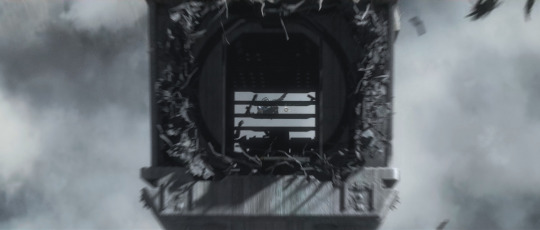
Which, while we all love those Tech crotch shots is somewhat less impactful emotionally. These frames go through multiple departments and get multiple eyes on them before going through final animation, and no one thought that leaving him face up and unobscured until he disappears into the fog would stick more firmly in the viewer's memory?
The Flip Might be Intentional
And I don't just mean out of universe, as every detail of animation is often intentional, but in universe as well. If you look closely at Tech as he falls, he seems to roll his shoulders back in order to begin flipping over. It was a specific enough detail to send me searching for a reason and I found it in instructions on how to survive a long fall - the first thing that you're supposed to do? Get into the arch position like a skydiver to slow and control your fall.
The flip was important enough to not only include but to include the small detail of Tech intentionally flipping himself over into said position. It's not a confirmation but it's an interesting detail, and one that has very few other reasons to exist.
THE AFTERMATH
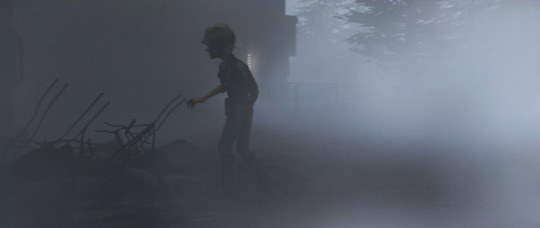
Image chosen because even thinking he's alive I didn't want to pull from Omega reacting to the fall on Ord Mantell. Looking at her makes me Sad. So the fall has happened, the rail car has rushed forward and crashed, and Omega fades in and out of consciousness until finally waking up on Ord Mantell to the bad news.
"What if he's hurt?"
Omega is our POV character for the show. We may sometimes see things she doesn't, but emotionally she remains the center of the narrative, the character that the target audience will see themselves in. Her ultimate thoughts on a situation are the closest we have to a clear indicator of our intended takeaway.
So it's interesting that the first thing we hear out of her, having heard that Tech 'didn't make it,' is a firm denial. He can't be gone, he might be hurt, he needs them and they need to go back for him. And, despite Hunter continuing to talk with her about it for a bit, we never actually hear Omega explicitly take it back or verbally acknowledge Tech as dead. The closest we get is 'lost' which she also uses for Echo in The Crossing.
Now, here's where the interpretation between the adult and child audience will likely differ. From an adult perspective, this is a reasonable reaction for a child her age. It comes off as very natural that she doesn't want to accept it and that she doesn't have time to really process that it's true before the scene moves on. It makes sense from an in universe perspective.
However, the main audience is still children who actually are Omega's age and who are being presented with her as their window into this world. And their takeaway, seeing that same scene, is likely to be that Omega is correct. They don't know that Tech's dead, just because an adult says it doesn't make it true and just because Hemlock says it DEFINITELY doesn't mean it's true, they have to go back and check.
If they wanted the main audience to think that Tech is dead for sure, they could have had Omega be the one to say that he's gone, with Hunter simply confirming it for her. Alternatively, Omega accepting it when Hunter tells her would also function in the same way - ultimately, as the POV character, if Omega doesn't accept it there's a strong possibility much of the audience won't accept it either, especially without other evidence.
No Body?
And, as we all know, we simply don't have other concrete evidence. Not only are the batch given no time to look for Tech's body or any confirmation that he died, but we get a whole scene with Hemlock and the goggles where he also confirms verbally that he doesn't have a body either. There's very little reason to have him say this outside of putting a bug in the viewer's ear that he might not be gone for good.
Not only do we have that verbal confirmation, but we have multiple places where a body could have been included or implied without adding much to the runtime.
Easiest place would probably be when Omega passes out - there's a trooper's corpse right there in front of her, and it would have been very easy to make that identifiable as Tech. Have one of the boys check his pulse like Crosshair did with Mayday and then be forced to leave after confirming he's dead. Would it require a little bit of fudging the details of how he landed so close to them, sure, but it would have been narratively streamlined and easy.
Have Hemlock bring his helmet rather than his goggles (and damage it in a way clearly incompatible with survival) or confirm that he did find a body but has no use for the goggles.
Put the body in Hemlock's lab when Omega is brought there at the end of the episode. Have a sheet covering him even if you want and just one of his hands hanging out, especially the one with the distinctive light on the back of it. Give us her reaction to that.
These are just the ones that don't involve adding scenes or making major changes - instead, in a franchise known for bringing back everyone and their grandmother especially if there's no body, they chose to leave it extremely vague.
Reused Score
The soundtrack for Tech's sacrifice is fantastic, I don't think anyone can argue that. In fact it's so good that it's used occasionally used as a reason for why he's dead for real. If it's a fakeout, why go so hard on the music?
It almost sounds like a reasonable argument, except that the music isn't even unique to Tech's fall. We get the same motif later in the episode with Omega's capture, and it actually comes in even harder and more impactful there than it did with Tech falling.
Reusing bits of the music has two results. It lessens the impact of hearing it with Tech if it is in fact his Death music, because it makes it clear that he is not the central feeling of the episode but rather, Omega's capture is. As mentioned before, deaths are usually the climax of their own episodes partially to avoid them being upstaged by any other plot points, but here Omega's capture is fully prioritized over the loss of one of our central characters.
The second result is that it changes the meaning of the music. It's no longer meant specifically to underscore a tragic death, but rather a more general one of loss and separation. And if it's simply about that separation, then it no longer requires Tech to be dead to have that same impact. They're apart from each other, and that's painful enough.
SEASON 3 SO FAR
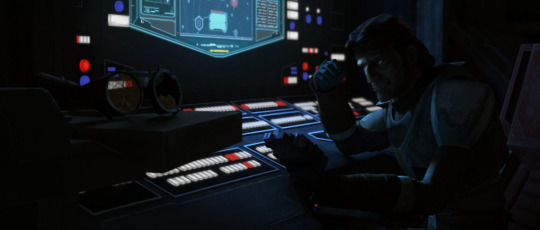
Which of course finally brings us to season 3! We're five episodes in as of the posting of this, so a full 1/3rd of the season down, which gives us a good idea of how they're handling the whole grief aspect of this scenario.
They Aren't!
That's right, we simply have not directly acknowledged or dealt with the whole 'watching your squadmate fall to a presumed horrible death' thing even once in five episodes. Tech has been mentioned by name twice, we've seen his goggles once, and Wrecker makes one sideways reference to him having not made it back.
In universe, there is a several month timeskip and it seems to be implied that the majority of the grief milestones happened in that gap. For example, we don't see Crosshair finding out from Omega, we don't see Omega grieving her brother, we don't see Phee finding out (more on her in a bit) despite her fledgling romance. Months of grieving and processing skipped over and what comes out the other side is single line mentions that go by in seconds.
This is especially apparent after episode 5, where we got something to compare it to. Crosshair has a long, painful moment of grieving with Mayday's helmet when they return to Barton IV. It's deep, personal, and intimate and we take a minute with him gathering up the helmets of Mayday and his men to set them up on the crates the same way that Mayday had honored them.
Mayday is a one episode character that was important to only a single character, Crosshair - Tech is a core member of the team present through two full seasons and shown as close to every member of the squad. Yet the single scene grieving Mayday is longer and more emotionally gripping than every short mention of Tech so far in season 3.
Narrative Grief
Seeing characters grieve their loved ones onscreen is about more than just the characters themselves. It's also part of the viewer experience - through the characters' grief, we're able to process our own grief at the loss. It makes it feel real, it makes it feel personal, and the amount of grieving needs to be proportionate to the character's importance in the story.
This is especially true in a show written for children like The Bad Batch. Kids don't typically have the same experience with death as adults, and a well written main character death within a children's show will need more time and energy spent towards making the loss feel real. We see this with deaths like Kanan's; it wasn't Jedi Night that told the viewer that Kanan was really, truly dead, it was Dume, where the characters mourned him and dealt with the aftermath.
Currently, with Tech, we do see holes in the team that make us miss Tech but they remain completely unaddressed by the characters. We see Tech's goggles, but Hunter isn't looking at them, he's looking at Lula. Omega mentions Tech having taught her all the plans, but without any real sadness on her or Crosshair's part. The closest we get to actually bringing it up are Wrecker saying 'not everyone came back' and Echo mentioning the datapad would be difficult without Tech, and both of those are only seconds long before moving on. They don't serve as any kind of catharsis for the viewer, relying more on gut punch impact and keeping the wound open rather than allowing it to heal. The difference between the treatment of Tech's death and Mayday's just makes it more stark.
How Do You Like Yearning?
Interestingly, though, it strongly resembles the writing team's handling of another situation: Crosshair's departure from the team in season 1 vs Echo's in season 2. The show even drew a lot of flack for the lack of discussion on Crosshair's betrayal, as outside of a couple conversations the matter often went unremarked on. Echo leaving, on the other hand, got a whole episode dedicated to processing the loss immediately after it happened.
So what was the difference? Crosshair's departure is part of a long term plot point. We're supposed to want him back, we're supposed to want the team to talk about him, anything that would ease the tension. The writers on the other hand want that tension to remain until it's time to actually resolve the plot. So we get those slow drips in between bigger encounters, we get opportunities for Crosshair to come home that he doesn't take, and we don't get the catharsis of the team actually talking about any of it. We're left to want and imagine it, using the yearning to keep it on people's minds more than anything.
If Crosshair had been discussed on screen long enough for the characters to actually come to terms with his absence, though, that would have made the plot feel more settled and resolved early on. It might be conversations we want to see, but it doesn't keep the viewer on edge and craving a resolution. Best case scenario we're just not as desperate for Crosshair to come home - worst case scenario we accept that he won't be returning and find the fact that he eventually does to be unrealistic.
Echo on the other hand gets their absence processed immediately, because their absence from the team is not meant to be a huge plot point. It's something the team has to deal with, yes, and the viewer wants to see them again just like Omega does, but Echo returning isn't meant to be a maybe, and it's not supposed to keep the viewer wondering and worrying. It's a when, not an if.
Similarly to Crosshair, Tech has never felt like a resolved plot point. We don't get confirmation on his death, we don't get any long term grieving, and we get drip fed acknowledgements that pry the wound back open. If we actually see the team discuss and come to terms with their grief and loss, the plot point closes, the wound closes and we begin to fully accept a team without Tech in it, which makes it harder to reinsert him into the storyline if he is in fact alive.
If he's truly gone for good, what is the point of denying closure to the audience? We know that they are capable of writing an intense mourning moment that feels completely in character for otherwise emotionally repressed men such as Crosshair, so why not give us that with the team mourning for Tech? A memorial, an intimate moment with the goggles, a short scene of Crosshair finding out about the loss, or anything at all really? Once again it's something that makes sense if he's alive and we're simply not being shown yet, but makes very little sense to not capitalize on if he's dead.
What's to Come
We have ten episodes of season 3 to go, and a lot to cover. Reviews have indicated that Tech is not explicitly brought up in the first eight, so the earliest we could possibly have a survival reveal is in episode 9. Will it actually happen? Maybe, maybe not. Though interestingly episode 9, The Harbinger, is almost exactly one year after Plan 99, just like The Return aired almost one year after The Outpost. Could mean nothing, but they do enjoy their anniversary dates.
One thing we do know for sure is coming up is Phee's inclusion - she's seen in the official trailer, as well as briefly in a recent twitter spot. This is interesting as Phee is, of course, Tech's teased love interest, and her connection to Tech has been emphasized multiple times, including on her Databank entry and the official 'what you need to know about season 3' guide. When she comes onto the scene, it's very likely that more information about Tech will too.
MARKETING, INTERVIEWS, & SOCIAL MEDIA

I wanted to keep this mostly focused on what can be seen within the show itself, but it's impossible to talk about whether or not Tech is alive without pointing to the absolutely bizarre messaging from the cast and crew, as well as the marketing choices surrounding his sacrifice. (Example: the Instagram Mourning Filter they layered over him in the official trailer, as seen above) I won't get quite as detailed here as in the above, but it does have to be mentioned.
Constant Focus
In between the end of season 2 and the posting of the season 3 trailer in late January, there were several posts on various official Star Wars media. The majority of them were about Tech and Plan 99. In fact, I don't think I ever saw anything mentioning the giant 'Omega's been captured' cliffhanger, just Tech. Over and over again.
Once a character is dead, marketing generally stops caring about them. They're forward focused after all, they want you coming back for what's to come not lingering on what won't be relevant again. So why the constant focus on Tech?
And it wasn't just the social media either - a huge portion of the trailers and reels included old footage of him too. For the most part this was from Plan 99 and bringing up his fall again to rip open those old wounds, but in one case they included action footage from The Summit. This was an interesting case, because the majority of people watching wouldn't have recognized it immediately. Fittingly, the entire comment section was full of nothing but 'Was that Tech?' style comments, which they would have known was going to be the case to start with.
So why are we so focused on a man that's supposedly dead? If he's genuinely never going to show up again why keep putting him in? Everything? While not even bringing him up all that often in the show? If he's dead, this is a truly bizarre marketing decision.
Never Say Die
In interviews or in official material. For several months the word 'dead' was never used for Tech anywhere, not in interviews, not in official material, nowhere. It took until January 23rd for all of the databank entries to be updated, and among all of the main cast he's only referred to as 'killed' once, and it's on Hunter's page not even his own. Then, the Friday before the premier, an interview came out referring to him as dead - on the part of the interviewer, not the creators themselves.
Everything else seems to use a variety of euphemisms. His sacrifice, his absence, his loss, he 'plummeted out of sight', he 'fell from a tram car', he did absolutely anything it's possible to do except outright die apparently.
It's an odd choice when there's known controversy over if he's dead or not. The standard operating protocol of course, in a planned comeback, is to refer to them as dead anyway and allow fandom to fuel its own speculation, but with a fandom as devastated as TBB's was, it's quite possible that the odd behavior had to be introduced just to keep speculation going. The only interviews that sound remotely final came out right before the episodes started coming out - if they had done that from the beginning, the chances of people outright refusing to come back to the show likely would have been higher.
Much like the marketing, this is not necessarily proof of anything - but in combination with the multiple odd things in the show itself, it's certainly suspicious. Speaking of suspicious...
What an Odd Thing to Say
The cast and crew themselves have not been skimping on making strange comments when it comes to the Tech situation.
There is of course the well known Joel Aron (lighting director for the series) tweet that came out the day of the Celebrations panel (AKA when the Tech trauma was at an all time high) and in direct reply to a fan that was having a hard time with Tech's death. It's hard to take it as anything but a reference to Tech given the timing, and it was certainly taken as being about Tech in the quote tweets. If it's not about Tech, why tease the fandom with it? And the specification for it being a mid s3 episode as well...
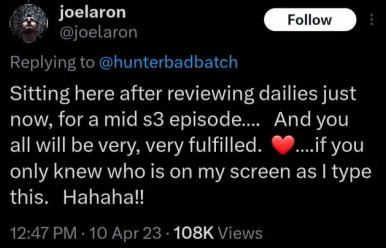
Also from the day of Celebrations, and from the panel itself, we have Michelle Ang saying in front of God and everybody, that Tech "doesn't come back... in this episode, at least." At the time there was a possibility she didn't know and was just leaving it open, but with that only being ten months ago and the extremely long timeframe of animation, it's almost certain that she would have been done with all primary recording by that point. If you know he's not coming back, how do you accidentally imply that he is with no one correcting it?
Dee Bradley Baker, when asked for a farewell message from Tech at a con, came out with "the life of a soldier is fulfilled by fulfilling his mission and supporting his brothers. And this was the end of mine. And that's a good thing." Which was a perfectly serviceable goodbye right up until he said that the end of Tech's (life? soldier's life? mission?) was a good thing.
During an instagram interview we have Deana Kiner, one of the composers, in response to the interviewer talking about the final episode containing a major loss, saying, "It's kind of a loss... It's complicated." The claim on twitter was that this was about Omega, because everyone knows that when someone mentions the major loss in Plan 99 they're definitely talking about Omega.
So is Tech alive? Is Tech dead? We still don't know. But while one or two of the above might be a coincidence, having all of them at once coalesce around this single character death is a lot to chew over. The Bad Batch team has shown willingness to address grief and loss prior, as well as a willingness to show us death onscreen and front and center. So why, with such an important character, sidestep it all in order to keep it vague? Why keep it from sounding final for so long, if the intent the entire time was for him to be dead for good?
We won't know until he either shows back up or the show ends. If Tech's alive, all of the above starts to make sense. If he's dead... well a lot of things will just never quite add up. I feel that this team has shown enough willingness to follow up on their trailing plotlines that they've earned my trust. Fingers crossed for a satisfying resolution for all of us, and for our boy Tech, whatever that resolution may be.
#the bad batch#tbb#tbb tech#the bad batch spoilers#tbb spoilers#the bad batch speculation#this thing is some 7500 words i might have an obsession problem
286 notes
·
View notes
Text
Why Suletta and Miorine's story is a romance: A Mobile Suite Gundam: The Witch from Mercury story structure analysis by Sodasa
So, I recently watched The Witch from Mercury, and I felt compelled to write an analysis of the show's use of the story structure of romances. I'm a hobbyist in the history of trends in genre fiction with a particular interest in romances. I thought it would be fun to use my area of expertise to talk about how the budding relationship between Miorine and Suletta is intertwined with the story of G-Witch.
Something particular about the romance genre is that, unlike other genres of fiction, it's mostly defined by its story structure. This means that just because a story is about two people getting together does not automatically make it a romance in the same way having magic in a story qualifies it as a fantasy. The flip side of this is that while you can't have a fantasy without fantastical elements, a romance can be put in any setting. As long as the story hits the required plot beats, it's still a romance. This makes Romance simultaneously one of the strictest and most versatile genres, as the plot can be anything as long as it ties into the main characters' developing relationship. Use this structure in a story about financial politics and mechs, and you get a story like The Witch from Mercury.
I think the show uses this structure very effectively. In my opinion, a great romance should, first and foremost, be an exploration of the part of the human condition where previous bad experiences make us reject intimacy. The romance story structure is designed to have the characters come face-to-face with their inner demons by giving them a reason to overcome them. Something that's a lot harder to pull off outside of romances, as not many things in life require us to overcome some of our deepest insecurities instead of just pushing them down.
G-Witch is a great show to use as an example of what makes a romance a romance as it follows the story structure almost to a tee, but it's also not the kind of story that most people usually think of when picturing a romance. I also believe that seeing the show through the lens of the romance structure leads to some juicy character psychoanalysis for Suletta and Miorine. I'll go over all the plot beats of a romance and explain how they apply to G-Witch and, if applicable, why I think you don't see those plot beats outside of romances. The names of the plot beats are taken from "Romancing the Beat: Story Structure for Romance Novels" by Gwen Hayes, which is also my primary source, along with my own extensive experience with the romance genre.
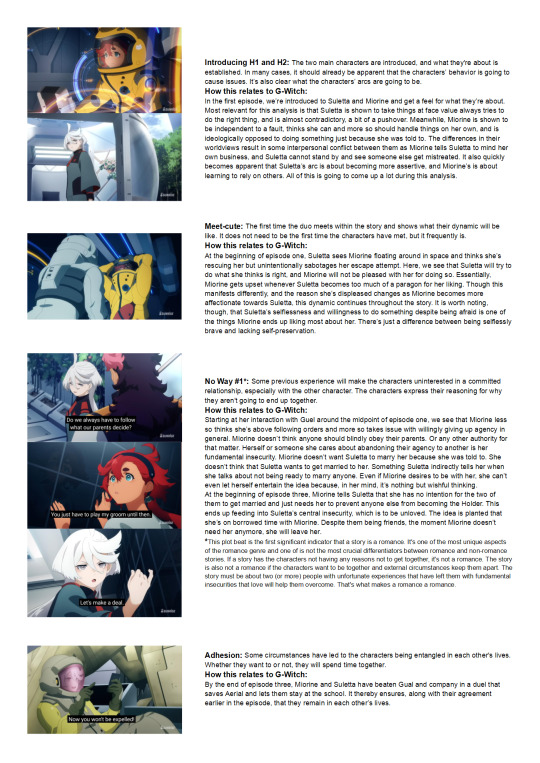
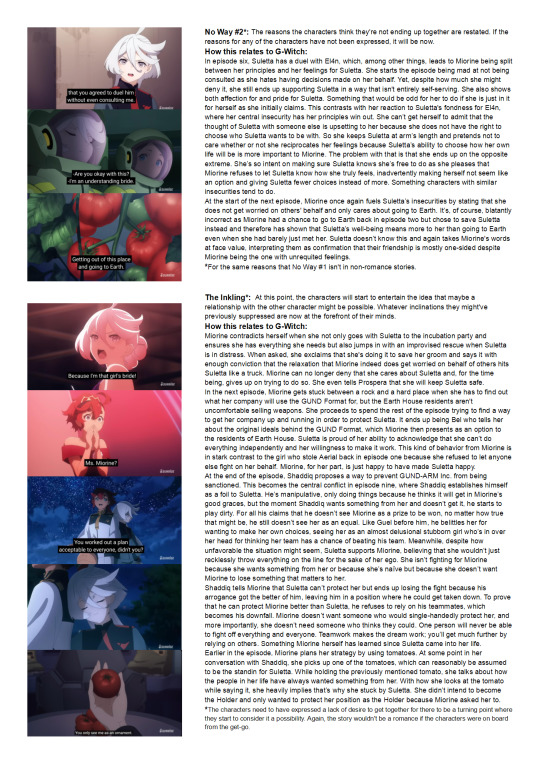


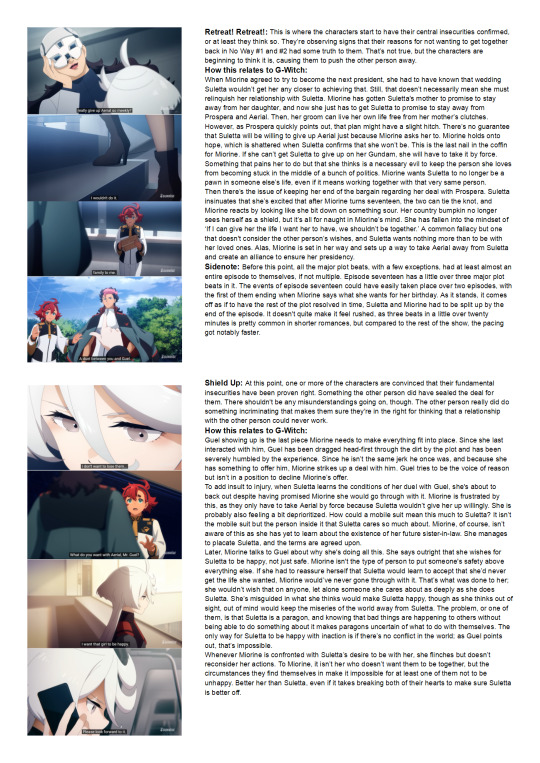



I hope someone gets something out of this. I have seen some excellent analyses and theories for this show, but they have been on things I don't know much about myself. Since the only part of story analysis I excel at is the structure of romances, I thought I'd lend my own area of expertise. I want to clarify that while I might sound matter-of-fact, this is just my opinion. I'm by no means saying that you have to think that G-Witch is a romance. I'm just arguing for why I personally consider it to be one.
#mobile suit gundam: the witch from mercury#g witch#the witch from mercury#suletta mercury#miorine rembran#sulemio#suletta x miorine#honestly I had too much fun making this#I can't write an analytical essay to safe my life#but I'll write a 7500+ words media analysis just to justify calling a mecha show a romance
287 notes
·
View notes
